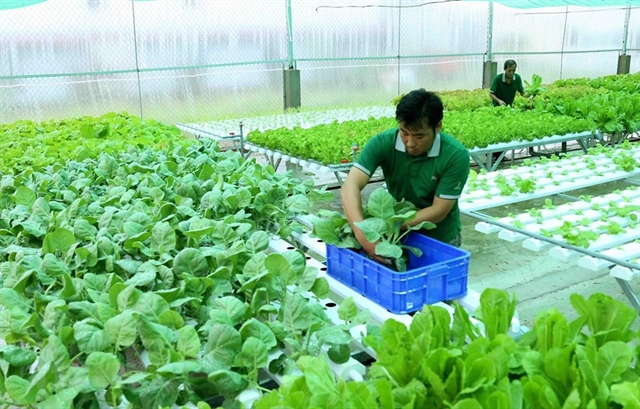Organic farming is emerging as a leading solution in safeguarding ecosystems, while meeting the rising appetite for clean and safe food, said businesses.

HÀ NỘI — As health and environmental sustainability concerns grow, ecological, organic, circular and friendly-farming models are increasingly in demand. Organic farming, in particular, is emerging as a leading solution, safeguarding ecosystems while meeting the rising appetite for clean and safe food, said economists and industry insiders.
The shift towards healthier and more sustainable lifestyles reshapes consumer habits, prompting businesses to adopt environmentally friendly technologies and farming practices. This transformation is driving producers to prioritise sustainable development, reflecting the broader trends of the modern era.
According to PwC’s 2024 Voice of the Consumer survey, more than 80 per cent of consumers are willing to pay a premium for sustainably produced or supplied goods.
On average, shoppers are prepared to spend 9.7 per cent more for organic products that meet environmental criteria. This willingness reflects growing consumer awareness of the links between health, food safety and environmental impact as Vietnamese consumers are particularly receptive to organic products.
A report by AC Nielsen highlights that 86 per cent of consumers in Việt Nam prioritise organic options for their daily meals due to their nutritional value, safety and minimal environmental impact. The survey also reveals that 24 per cent of respondents consume organic food daily, with an additional 16 per cent and 21 per cent consuming organic products four to five times a week and two to three times a week, respectively.
The surge in consumer demand is driving rapid growth in organic farming across the country. Numerous start-ups and cooperatives are scaling up operations, offering innovative solutions to meet this demand.
In Chúc Sơn and Nam Phương Tiến, farmers are cultivating organic vegetables, while VietGAP-standard farming models are thriving in Hà Nội. High-tech organic agricultural production is also gaining momentum in regions such as Cẩm Khê (Phú Thọ), earning the trust of consumers in northern Việt Nam.
Elsewhere, Quế Lâm Group has introduced organic rice and bio-organic pig farming in Vĩnh Phúc. Other notable initiatives include Shan Tuyết tea and organic fish farming in Tuyên Quang, organic rice and tea production in Thái Nguyên and mobile floating shrimp farms in Quảng Ninh. Additional models, such as Biophap’s organic farming projects in Kon Tum and Gia Lai, showcase the country’s commitment to sustainable agriculture.
Sellout
The availability of organic products is also improving, with most major retail chains in Việt Nam dedicating specific shelf space to organic produce. According to the Commercial Manager of Fresh Food Value Chains at Central Retail Việtnam, Lê Thành Trung, organic vegetables are priced 25–35 per cent higher than conventional options, yet remain highly sought after.
“Many customers need to pre-order because these products often sell out,” he said.
Director of Co.opmart Phú Thọ, Nguyễn Văn Hiệp, reported double-digit growth in organic food sales during the first half of the year. Beyond retail chains, organic products are also sold through e-commerce platforms like Shopee, Lazada and Tiki, as well as specialised stores such as Sói Biển, Bác Tôm and Unimart. Notably, while safe vegetables often struggle with distribution, organic vegetables maintain consistent growth in demand, with relatively high wholesale prices of VNĐ15,000–20,000 per kilogramme.
The growth of organic agriculture is not limited to Việt Nam. Mordor Intelligence, an Indian market research firm, projects that the global organic food and beverage market will grow significantly, reaching over US$174 billion by 2024 and exceeding $233 billion by 2029. This expansion represents a compound annual growth rate (CAGR) of 6.02 per cent. The Asia-Pacific region, where Việt Nam plays an increasingly significant role, is leading this trend, demonstrating the strongest growth prospects during the forecast period. — VNS





